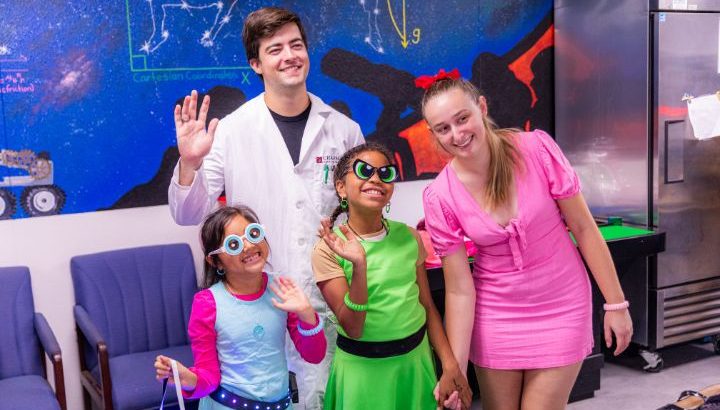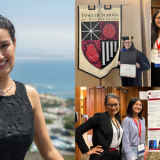
Infusing the Importance of Design with Purpose in Curriculum: Hand-Made Halloween Costumes Make Engineering Accessible to Local Youth
November 9, 2023
At the Fowler School of Engineering, we prepare students to solve real-world challenges using the skills they’ve learned in the classroom. In addition to teaching engineering concepts, faculty extend these lessons beyond the classroom to infuse the importance of community involvement and engagement in the engineering student experience. For example, our 3D printing course infuses the importance of human-centered design into the curriculum, making the student experience even more rewarding.
Since 2019, Chapman engineering students work with Higher Ground Youth and Family Services, a local after-school program, to meet and collaborate with underrepresented youth to create customized, highly functional 3D-printed Halloween costumes. This collaboration aims to bridge the gap between marginalized communities and the accessibility of STEM by starting in the local community.
“There are people who still talk about being part of this project for the rest of their lives and the kids remember it forever,” said computer science student Emma Garofalo ‘25.

Emma Garofalo (Computer Science ‘25) and her classmates created a three-piece animatronic mask for their Higher Ground student.
Bridging the Gap Between Diversity and STEM
In addition to offering the kids from Higher Ground one-of-a-kind costumes, they are exposed to accessible engineering programs like those offered at the Fowler School of Engineering.
“Engineers serving their surrounding community gives others opportunities that they normally would not have,” shared Interim Dean Tom Piechota.
Joe Baldo, founder of Higher Ground Youth and Family Services enjoys partnering with Chapman University to bring a world of opportunities to these grade-schoolers, “Higher Ground is all about giving the vision for these kids that there are so many different opportunities for them,” said Badlo.
This partnership is an opportunity for Chapman Engineering to use the state-of-the-art facilities to give back and encourage kids of all ages and experiences to get involved with technology and engineering. “It proves that engineering can be used to help other people, no matter what situation,” said Electrical Engineering student Tony Labrado Polanco ‘25.
Human-Centered Design for Social Impact
Part of the experience for Higher Ground participants and their families is visiting the Fowler School of Engineering and seeing the behind-the-scenes look at how their costumes are made. “They’re creating this costume and that opens up their [kids] minds to like ‘geez, these are students who are creating these and making them’. And then of course these students are saying ‘Well let me show you how to make them’”, said Baldo.
In addition to creating exquisite costumes, the engineering students demonstrate the technical components behind each costume. They are introduced to the power of engineering in an uncomplicated approach.
The faculty and students show them how to 3D print, explain the basics of soldering, and demonstrate how coding is implemented into LED lighting. This introduction to engineering connects them to the world of STEM and makes their dream of becoming an engineer possible. “It’s planting the seed that this is something they could do, that it’s achievable,” said Baldo, Higher Ground Founder.

Chapman Engineering student created a custom-made light-up Barbie vest along with a 3D-printed cowgirl hat.
Hands-On Learning to Solve Real-World Challenges
With a strict deadline, Chapman engineering students were prompted to pull the skills they’ve learned in the coursework to think on their feet. “All those skills were accumulated in class made sure our projects were really successful,” said Garofalo.
Through this project, engineering students learned skills far beyond their years such as 3D printing, soldering, and LED light programming. “It’s kind of crazy, we’re only halfway through the semester and we’re already building entirely 3D printed projects when a lot of us haven’t even 3D printed ever before,” explained Garofalo.
Students had to be quick on their feet to create magnetic helmets, a functional voice-changer, and animatronic masks. In addition, students learned realistic time management skills and how to progress with a project even after failure.
Projects like this one are incorporated into Chapman Engineering’s curriculum to offer project-based experiential learning for undergraduate students and to demonstrate the level of accessibility in the field of engineering to our local community.

